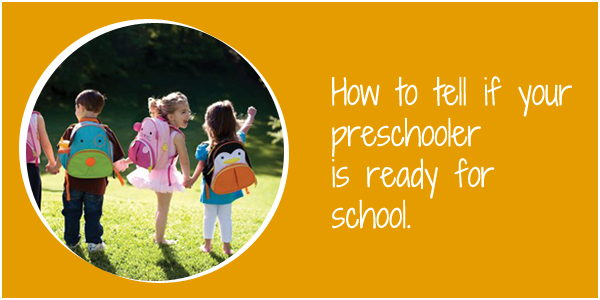That every child develops at a different rate is established. Normally preschools start accepting children at 2 ½ years of age. But just because a child has crossed 2 ½ years of age doesn’t mean he is magically ready for preschool. There are a lot of things to ensure your child receives full benefit of attending a pre-school or worse doesn’t actually regress in certain areas.
Here is a list of questions taken from Patricia Henderson Shimm’s Parenting Your Toddler that will help you answer this question.
Is your toddler fairly independent?
Bigger preschools in India require toddlers to be potty trained. If your toddler is potty trained, can he successfully convey the urge to go and use the washroom? He should be able to wash his hands (with some assistance, if required), eat his tiffin on his own and sleep unassisted.
There are other things like painting, drawing and playing in groups that he will learn at school.
Spending time away from you
If your child has already spent time away from you in the care of a relative or a baby sitter, you are golden. Such children rarely have any separation issues when starting school.
However, if this is the first time your child is going to leave you, there is not much to worry, except a lot of tears and heartbreaks (sometimes from you too!). Children who leave their mothers for the first time when starting school are generally eased into the routine of a preschool by starting in small doses. Like visiting the school for an hour and then gradually increasing the time.
Does your child follow instructions?
Many preschools have circle times where they are required to participate in group activities at the same time. It also requires the ability to listen, comprehend and follow instructions. While this may seem like a tall order, for a toddler who can barely sit still, you can start getting the child into the groove by starting some similar activities at home.
This way, he will get used to group activities and find it easier to adapt when he starts preschool.
Does your child have regular schedule?
Preschools have a regular routine of activities each day. Circle time, play time, snack, outdoor play and then home. Regular routines help toddlers to feel comfortable and assured in their new environment. If your toddler doesn’t already have a daily routine, now is the best time to start him on it.
Does your child have the stamina for school?
Preschools are very engaging. Day trips, outdoor activities and art projects can all keep your child mentally engaged. If your child loves one activity after the other, without feeling overwhelmed or cranky, there is no need to worry.
But if your child still needs his mid morning snooze, or finds it difficult to jump from one activity to another, it may not be time for preschool yet.
To prepare your child for preschool, schedule his day as close to the routine followed at the preschool of your choice.
Finally, analyze the reasons for sending your child to preschool. IF you simply need someone to take care of your child, then daycare could be simpler.
If you think your toddler won’t be ready for kindergarten at the right age, then those skills can be developed at home or even in a daycare with loving caregivers.
Or if your child gets bored at home and seems eager to explore and learn new things, it is the right time for a preschool.
